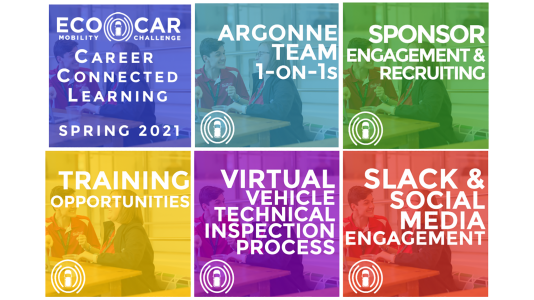
The University of Alabama has been named the EcoCAR Mobility Challenge Year Three champion, taking the lead in the premier four-year collegiate engineering competition. Rounding out the top three are Ohio State in second place and West Virginia University in third place.
“This past year has brought unprecedented challenges, but we pivoted quickly and found unique ways to deliver a high-quality educational experience for EcoCAR students,” said Kristen Wahl, Advanced Vehicle Technology Competitions (AVTC) Director at Argonne National Laboratory. “The EcoCAR Mobility Challenge brings together some of the most innovative young minds to solve complex challenges facing the future of mobility. These students have demonstrated their ability to navigate new obstacles and develop unique solutions that will help America’s transportation sector design more efficient vehicles.”
During the virtual awards ceremony, winners in over 40 categories were recognized, and over $100,000 in prize money was awarded to the associated universities. For jumping to the top of the leaderboard, the Roll Tide took home an extra $10,000 to further support the university’s advanced vehicle technology program.
EcoCAR — the latest U.S. Department of Energy Advanced Vehicle Technology Competition sponsored by General Motors (GM) and MathWorks — challenges 11 North American universities to apply advanced propulsion systems, electrification, SAE Level 2 automation and vehicle connectivity to improve the energy efficiency of a 2019 Chevrolet Blazer, all while balancing factors such as emissions, safety and consumer acceptability. Teams have four years (2018-2022) to transform their vehicles from design concept into reality, building an energy-efficient, connected and semi-automated vehicle.
Year Three marks a critical point in the program, when students must make the pivot from propulsion system integration to controls development and testing. Throughout the past two years, the students worked to conceptualize and build the framework for their redesigned Chevrolet Blazers. But it wasn’t until the EcoCAR vehicle testing in May — the most important competition event — that teams could finally get behind the wheels of their Blazers at their local testing facilities to assess their drivability, performance and energy efficiency.
Each team was scored across six key areas ranging from propulsion system integration, propulsion controls and modeling, to connected and automated vehicle systems (CAV), project management and communications.
“We’re always impressed by the level of creativity students bring to this challenge, and this year the students exceeded our expectations,” said Kelly Speakes-Backman, Acting Assistant Secretary of Energy Efficiency and Renewable Energy at the U.S. Department of Energy. “The EcoCAR students have demonstrated their resolve and creativity to transform their virtual designs for the future of mobility into reality — all with the additional constraints brought on by the COVID-19 pandemic.”
Of course, the 2020-2021 competition was a little different: a year of remote training and vehicle testing, adapting to the flexible learning environment of university students and faculty. AVTC competition managers found new ways to provide students with an EcoCAR experience as close as possible to in-person learning.
In September 2020, the AVTC section launched the EcoCAR Mobility Challenge’s Career Connected Learning (CCL) initiative — a dynamic, year-long effort that enables EcoCAR teams to work in a semi-virtual environment. In January, AVTC launched the EcoCAR Podcast, a monthly podcast that gives listeners a look under the hood of EcoCAR. Sponsors, industry subject matter experts, students, university faculty, organizers and other special guests discuss a wide range of topics. To further ensure that teams and sponsors of the program connect, the AVTC section hosted an EcoCAR virtual career fair on February 11. Over 100 students participated in 404 live chats with recruiters from sponsors like GM, MathWorks, Bosch, dSPACE, AAM, NXP and more.
For more than 30 years, the U.S. Department of Energy has sponsored Advanced Vehicle Technology Competitions (AVTCs) in partnership with the North American auto industry, including the EcoCAR Mobility Challenge managed by Argonne National Laboratory. Featuring opportunities for both graduate and undergraduate students, these competitions stimulate the development of advanced propulsion and alternative fuel technologies and provide a challenging, real-world training ground for the next generation of automotive engineers. For more information, visit the EcoCAR Mobility Challenge website.